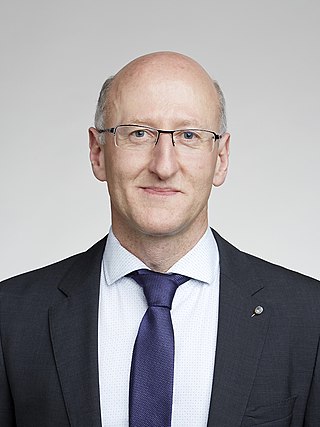Karen Heather Vousden, CBE, FRS, FRSE, FMedSci is a British medical researcher. She is known for her work on the tumour suppressor protein, p53, and in particular her discovery of the important regulatory role of Mdm2, an attractive target for anti-cancer agents. From 2003 to 2016, she was the director of the Cancer Research UK Beatson Institute in Glasgow, UK, moving back to London in 2016 to take up the role of Chief Scientist at CRUK and Group Leader at the Francis Crick Institute.

Metastasis-associated protein MTA1 is a protein that in humans is encoded by the MTA1 gene. MTA1 is the founding member of the MTA family of genes. MTA1 is primarily localized in the nucleus but also found to be distributed in the extra-nuclear compartments. MTA1 is a component of several chromatin remodeling complexes including the nucleosome remodeling and deacetylation complex (NuRD). MTA1 regulates gene expression by functioning as a coregulator to integrate DNA-interacting factors to gene activity. MTA1 participates in physiological functions in the normal and cancer cells. MTA1 is one of the most upregulated proteins in human cancer and associates with cancer progression, aggressive phenotypes, and poor prognosis of cancer patients.

Valosin-containing protein (VCP) or transitional endoplasmic reticulum ATPase also known as p97 in mammals and CDC48 in S. cerevisiae, is an enzyme that in humans is encoded by the VCP gene. The TER ATPase is an ATPase enzyme present in all eukaryotes and archaebacteria. Its main function is to segregate protein molecules from large cellular structures such as protein assemblies, organelle membranes and chromatin, and thus facilitate the degradation of released polypeptides by the multi-subunit protease proteasome.

V-type proton ATPase subunit H is an enzyme that in humans is encoded by the ATP6V1H gene.

Centromere protein H is a protein that in humans is encoded by the CENPH gene. It is involved in the assembly of kinetochore proteins, mitotic progression and chromosome segregation.

Cdc6, or cell division cycle 6, is a protein in eukaryotic cells. It is mainly studied in the budding yeast Saccharomyces cerevisiae. It is an essential regulator of DNA replication and plays important roles in the activation and maintenance of the checkpoint mechanisms in the cell cycle that coordinate S phase and mitosis. It is part of the pre-replicative complex (pre-RC) and is required for loading minichromosome maintenance (MCM) proteins onto the DNA, an essential step in the initiation of DNA synthesis. In addition, it is a member of the family of AAA+ ATPases and highly related to ORC1; both are the same protein in archaea.

Catherine Rosemary Martin is a Professor of Plant Sciences at the University of East Anglia (UEA) and project leader at the John Innes Centre, Norwich, co-ordinating research into the relationship between diet and health and how crops can be fortified to improve diets and address escalating chronic disease globally.
Raymond L. Erikson was a molecular biologist and virologist who noted research on cell growth and regulation. He also served as the John F. Drum American Cancer Society Professor of Cellular and Developmental Biology at Harvard University.

Sir James Cuthbert Smith is an Emeritus Scientist at the Francis Crick Institute, Honorary Fellow of Christ's College, Cambridge and President of the Council at the Zoological Society of London.
John Tooze FRS was a British research scientist, research administrator, author, science journalist, former executive director of EMBO/EMBC, director of research services at the Cancer Research UK London Research Institute and a vice president at The Rockefeller University.

Jonathon Noë Joseph Pines is Head of the Cancer Biology Division at the Institute of Cancer Research in London. He was formerly a senior group leader at the Gurdon Institute at the University of Cambridge.

Anne Jacqueline Ridley is professor of Cell Biology and Head of School for Cellular and Molecular Medicine at the University of Bristol. She was previously a professor at King's College London.

Sir Richard Henry Treisman is a British scientist specialising in the molecular biology of cancer. Treisman is a director of research at the Francis Crick Institute in London.
Caetano Maria Pacheco Pais dos Reis e Sousa is a senior group leader at the Francis Crick Institute and a professor of Immunology at Imperial College London.
Leonid A. Sazanov is a professor at the Institute of Science and Technology Austria (ISTA). Sazanov research explores the structure and function of large membrane protein complexes from the domain of bioenergetics. These molecular machines interconvert redox energy and proton motive force across biological membranes using a variety of mechanisms.
Li Zhang is a biologist currently working at University of Texas at Dallas. She is a professor of Biological Sciences and the Cecil H. and Ida Green Distinguished Chair in Systems Biology Science at the University of Texas at Dallas. During her 20+ years of independent research, Li Zhang has made major contributions to the understanding of Heme signaling and function in gene regulation, neuronal differentiation and survival, and lung cancer bioenergetics.
Julia Lesley Wilson is a British scientist who serves as associate director at the Wellcome Sanger Institute. Her research career investigates transplant rejection, cancer and inflammation. She previously worked at the World Cancer Research Fund and Breakthrough Breast Cancer.
Susan Mary Lea is a British biologist who serves as chief of the center for structural biology at the National Cancer Institute. Her research investigates host-pathogen interactions and biomolecular pathways. She was elected a Fellow of the Royal Society in 2022.

Zihai Li is a board-certified medical oncologist, cancer immunologist, and leader in academic medicine. He was recruited to Ohio State University Comprehensive Cancer Center – The James Cancer Hospital & Solove Research Institute (OSUCCC) in 2019 as the founding director of the Pelotonia Institute for Immuno-Oncology. He is a professor of medicine in the Division of Medical Oncology, holds the Klotz Memorial Chair for Cancer Research, and was appointed in 2023 as deputy director for translational research at OSUCCC.
Gabriele Ursula Dachs is a New Zealand academic, and is a full professor at the University of Otago, specialising in the how cancer cells respond to hypoxia, and developing novel treatments for cancer.










